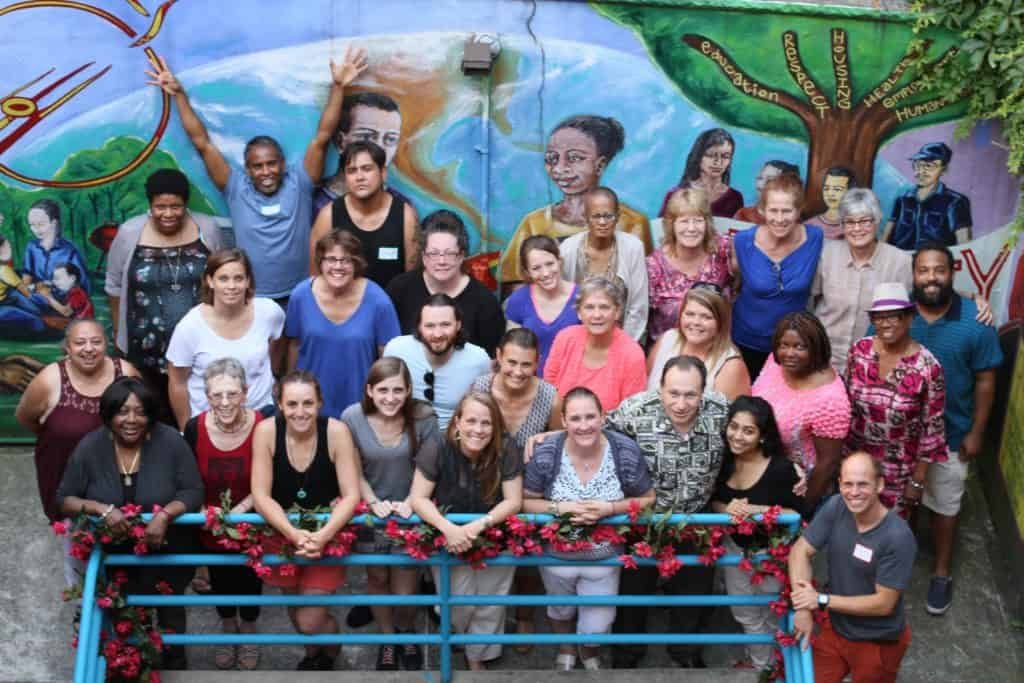What Does Poverty Mean in America? – News from the National MAP Seminar
Our Multidimensional Aspects of Poverty (MAP) research project, which looks to define poverty from the perspective of those who know it best, entered its final phase at the end of June as activists, practitioners, and academics from across the US came together in New York for the final MAP research seminar.
The four-day event, attended by over forty people, was a chance for the US research team to submit its tentative research conclusions to the men and women who had led the reflection on the aspects of poverty in the first place. As Maryann Broxton, co-director of the US branch of this international research project said,
“What makes this project unique is how we are including people living in poverty in every step of the research process, as co-researchers and not just subjects to be studied. The final seminar was the chance for those of us in the US research team to submit our tentative conclusions to representatives of all the different groups who had contributed to the research over the past year. Our job now will be for those of us in the US research team to re-integrate everything we’ve learned and update the dimensions before writing the final report.”
Just arriving at those tentative conclusions was itself a monumental task, with the ten members of the US research time having spent months pouring over the reports from twenty-three different peer groups that took place in six different areas across the country, even holding their own mini national seminar in Boston at the end of May to bring a sense of cohesion to the wide array of experiences that informed the work.
So… What is poverty in the US?
Those wide experiences were on vivid display as the final seminar began in the evening on Thursday June 28th. Participants added photos they had brought from home to the map of MAP on the wall of the Fourth World office in New York to show what motivated them to be part of this work.
A view of a park in the Bronx, an Indian Reservation in the deserts of New Mexico, a hillside in Appalachia, departed friends and cherished loved ones waiting back home – the images captured the joy, determination, and frustration of the fight against poverty from a wide variety of backgrounds.
The next morning, in small groups and larger plenaries, participants broke down the nine dimensions identified by the US research team and began to chip away, add on, and edit them into something that struck them as true.
This was no small task.
Take an idea like “disadvantaged areas” for instance. Appalachian delegates talked about having to drive hours to access even basic healthcare. For delegates from Boston, it was about living in an area where they don’t feel safe walking down the streets. For those from the Southwest it called to mind generations of colonization that stripped their ancestors of their land.
Different experiences that capture some of the tremendous diversity of this country into one common thread.
The end... is just the beginning...
With discussions around issues like racism, time, and gender equality, the four days were intense and full and just the beginning. As delegates returned home, the MAP project entered a new phase, moving towards a final report for the US to be released in early 2019.
On the international side, a final seminar will be held in France in September 2018, bringing together representatives from all of the six countries where MAP research has been conducted to repeat the same process as went on in New York in June: trying to find the common threads of what poverty means in such diverse day to day situations.
To that end, a week after the New York seminar closed, the ATD Fourth World international research team came to New York for the United Nations High Level Political Forum. Professor Robert Walker of Oxford University, co-director of the international research project, and Maryann Broxton spoke on a panel alongside Professor Jeffrey Sachs of Columbia University, Her Excellency Helena Yanez Loza, Ambassador of Ecuador, and others.
That an event with the title, “Defining Poverty with Those Left Furthest Behind” could draw such an impressive list of speakers and a standing room only audience shows how important and timely this issue is on the international level.
Heading into 2019, we will be making sure it remains relevant on the national and local levels here in the US as well.

